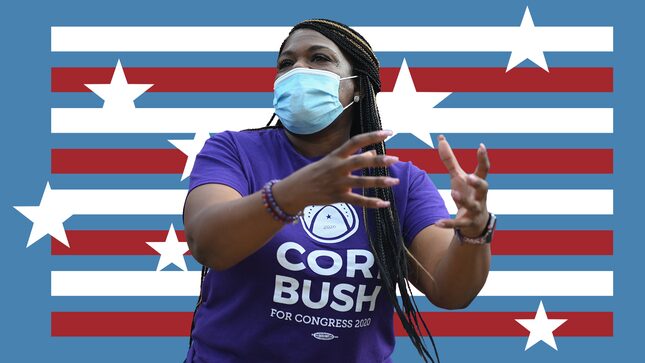
Graphic: Jezebel (Photo: Getty)
Cori Bush doesn’t often take the time to rest. During the 400 days of protests that erupted in Ferguson in 2014, where Bush rose to prominence as an organizer, she rarely missed a day, often arriving still in her nursing scrubs and sneakers. Earlier this year, just days after being hospitalized with what she suspected was covid-19, Bush was back on the streets to protest the killing of Breonna Taylor. And on a recent Sunday morning, she brought that same energy to a different form of political activism—registering people to vote and stumping for Joe Biden. For Bush, the 44-year-old nurse, pastor, activist, and soon-to-be member of Congress, her political career has emerged from that seemingly ceaseless energy that she’s carried with her ever since those days of protest in Ferguson. Her primary victory this summer over the long-time Democratic incumbent William Lacy Clay means that an activist forged in the rise of the Black Lives Matter movement is headed to Congress.
Bush hasn’t stopped moving ever since that primary win, hitting the road to get her future constituents to fill out the Census one day and then leading a protest against police violence the next. That combination of protest and electoral politics—Bush often describes herself a “politivist”—is the welcome, much-needed energy Bush will bring to Congress, and what she considers a necessary shift in how political progress happens. “We have to have both,” Bush told me, on her way back home after a morning spent registering voters, of street protest and electoral politics. “We need protests, because we need protests to pressure, we need the activism for momentum and drive and visibility.”
-

-

-

-

-

-

-

-

-

-

-

-

-

-

-

-

-

-

-

-

-

-

-

-

-

-

-

-

-

-

-

-

-

-

-

-

-

-

-

-








































